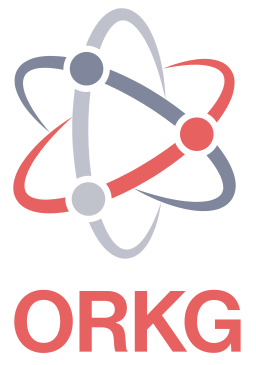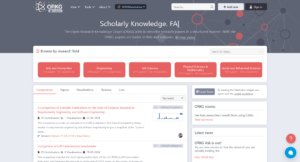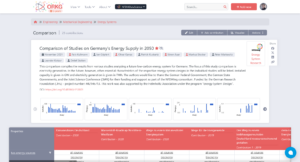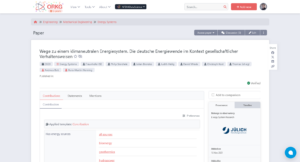Detailed description of the service
Capabilities: ORKG organizes research contributions in a structured manner, making them easily understandable and usable by both humans and machines. It supports the exploration of scientific knowledge across various disciplines and enhances the visibility of research outputs.
Added Value: For users, ORKG simplifies staying updated with the latest research, facilitates collaboration, and improves the discovery and innovation process by making research findings more accessible and comparable.
Suitable For: ORKG is ideal for researchers, academics, and students who need to manage and explore vast amounts of scientific data and literature.
Typical Use Cases: Common uses include comparing research findings, discovering new research trends, and collaborating on interdisciplinary projects.
Strengths: ORKG’s strengths lie in its ability to provide machine-actionable access to scholarly literature, its adherence to FAIR principles (Findable, Accessible, Interoperable, Reusable), and its support for structured data representation.
Weaknesses: One potential weakness is the initial learning curve for new users unfamiliar with structured data and knowledge graphs.
Limitations: ORKG may have limitations in terms of the completeness of its data coverage and the need for continuous updates to maintain its relevance and accuracy.
Terms of use & restrictions
To contribute or edit data in the Open Research Knowledge Graph (ORKG), users only need to create an account. However, reading and accessing the information is freely available to everyone. Creating an account is simple and free, requiring only registration with an email address.
Contact
Oliver Karras, oliver.karras@tib.eu
References
publications that reference (or report on using) the service
1. Reference on Service: Vinodh Ilangovan, Sören Auer, Markus Stocker, Lars Vogt, and Sanju Tiwari: Open Research Knowledge Graph. Cuvillier Verlag, 2024, ISBN: 9783689420039, https://cuvillier.de/get/ebook/7021/9783689420039_eBook_neu_1.pdf
2. Reference on Service: Markus Stocker, Allard Oelen, Mohamad Yaser Jaradeh, Muhammad Haris, Omar Arab Oghli, Golsa Heidari, Hassan Hussein, Anna-Lena Lorenz, Salomon Kabenamualu, Kheir Eddine Farfar, Manuel Prinz, Oliver Karras, Jennifer D’Souza, Lars Vogt, and Sören Auer (2023). FAIR scientific information with the Open Research Knowledge Graph. In B. Magagna (Ed.), FAIR Connect, vol. 1, issue 1, IOS Press. https://doi.org/10.3233/fc-221513
3. Reference on Use: Oliver Karras, Jan Göpfert, Patrick Kuckertz, Tristan Pelser, and Sören Auer (2024). Organizing Scientific Knowledge From Energy System Research Using the Open Research Knowledge Graph. In: Proceedings of the 1. NFDI4Energy Conference, ArXiv, 2024, https://doi.org/10.48550/arXiv.2401.13365
4. Reference on Use: Oliver Karras, Felix Wernlein, Jil Klünder, and Sören Auer (2023). Divide and Conquer the EmpiRE: A Community-Maintainable Knowledge Graph of Empirical Research in Requirements Engineering. In: Proceedings of the 17th ACM / IEEE International Symposium on Empirical Software Engineering and Measurement, ACM, 2023, https://dx.doi.org/10.1109/ESEM56168.2023.10304795
5. Reference on Use: Sören Auer, Markus Stocker, Oliver Karras, Allard Oelen, Jennifer D’Souza, and Anna-Lena Lorenz: Organizing Scholarly Knowledge in the Open Research Knowledge Graph. In: 1st Conference on Research Data Infrastructure (CoRDI) – Connecting Communities, 2023, https://dx.doi.org/https://doi.org/10.52825/CoRDI.v1i.272
#WhyNFDI
Short:
The Open Research Knowledge Graph (ORKG) is revolutionizing how we interact with research data, making a significant impact on everyday life and society. Here’s how:
1. Enhanced Accessibility: ORKG democratizes scientific knowledge, making it accessible to everyone, not just experts.
2. Improved Collaboration: It fosters interdisciplinary collaboration, leading to innovative solutions for societal challenges.
3. Efficient Knowledge Discovery: ORKG saves time by helping users quickly find relevant research, accelerating real-world applications.
4. Informed Decision-Making: Policymakers and practitioners can access up-to-date research, enabling better decisions that benefit society.
5. Educational Benefits: Students and educators can enhance learning with organized and reliable scientific information.
ORKG bridges the gap between complex scientific data and practical applications, promoting a more informed and connected society.
Long:
The Open Research Knowledge Graph (ORKG) is revolutionizing how we interact with research data, making a significant impact on everyday life and society. Here’s how:
1. Enhanced Accessibility: ORKG democratizes scientific knowledge, making it accessible to everyone, not just experts. By organizing and presenting data in a clear and structured manner, ORKG ensures that complex scientific information is understandable and usable by a broader audience. This increased accessibility helps bridge the gap between researchers and the general public, fostering a more informed society.
2. Improved Collaboration: ORKG fosters interdisciplinary collaboration by allowing researchers from different fields to share and compare their findings easily. This collaborative environment encourages the development of comprehensive and innovative solutions to societal challenges. By breaking down silos and promoting the exchange of ideas, ORKG helps accelerate scientific progress and the application of research to real-world problems.
3. Efficient Knowledge Discovery: ORKG saves time and resources by helping users quickly find relevant research. Its advanced search and comparison features enable researchers to identify key studies and trends in their field, facilitating more efficient and targeted research efforts. This efficiency can accelerate the application of scientific discoveries to everyday challenges, from healthcare advancements to environmental sustainability.
4. Informed Decision-Making: Policymakers and practitioners can use ORKG to access up-to-date research, enabling them to make informed decisions that positively impact society. By providing a reliable and comprehensive source of scientific knowledge, ORKG supports evidence-based policymaking and practice, leading to better outcomes in areas such as public health, education, and environmental management.
5. Educational Benefits: Students and educators can leverage ORKG to enhance learning and teaching by accessing a wealth of organized and reliable scientific information. ORKG serves as a valuable educational resource, helping students develop critical thinking skills and stay updated with the latest research developments. Educators can use ORKG to design more engaging and informative curricula, fostering a deeper understanding of scientific concepts.
Overall, ORKG bridges the gap between complex scientific data and practical, everyday applications, promoting a more informed and connected society. By enhancing accessibility, fostering collaboration, improving knowledge discovery, supporting informed decision-making, and providing educational benefits, ORKG is helping to shape a brighter future for all.
Miscellaneous
The new related service ORKG Ask allows researchers to find precise answers to their research questions by leveraging advanced technologies like semantic search and large language models. Simply enter your question in natural language, and ORKG Ask will provide relevant information from a vast corpus of research articles.
You can explore ORKG Ask here: https://ask.orkg.org/



